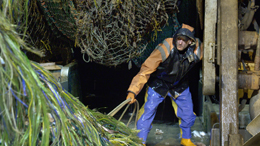March 27, 2017
A feature-length documentary about the plight of cod fishermen in Gloucester, filmed by Endicott College professor Steve Liss, will air nationally on the Discovery Channel on Thursday, April 13, at 9pm EST. Liss co-directed the film along with Boston Globe reporter David Abel and Andy Laub, founder and director of As It Happens Creative. The film was produced in association with Endicott College, which provided initial funding for the production. Students from the Endicott’s multimedia photography program filled key roles on the film’s crew.
Sacred Cod chronicles the historic collapse of America’s oldest fishery. Cod were once so abundant in the waters off New England that fishermen used to say they could walk across the Atlantic on the backs of them. In recent decades, as the Gulf of Maine has warmed at an alarming rate and environmental advocates cautioned about the dangers of overfishing, government surveys reported dire results: Cod had dwindled to as little as three percent of what it would take to sustain a healthy population. As a result, in the fall of 2014, the National Oceanic and Atmospheric Administration banned virtually all cod fishing in the region. Fishermen, told they could no longer make a living doing the only work they had ever known, were devastated. Young men who envisioned following in their fathers' and grandfathers' footsteps, feared that they might be the first generation who would not be able to fish for a living. Many argued that the surveys were flawed and the estimates of cod were incorrect. Despite protests against the government’s ban, hundreds were forced to sell their boats, and related businesses such as ice houses closed. “It’s the death of a way of life,” says one life-long fisherman interviewed in the film.
Students from Endicott, an institution known for integrating theory with experiential learning, jumped at the chance to get involved in the production. “The topic of cod fishing is one that resonates with Endicott – especially because of our geographic location. In addition to our main campus in Beverly, Endicott has a campus in downtown Gloucester and we have become embedded in the Gloucester community,” said Endicott College President Dr. Richard E. Wylie. “The Endicott community has been very impressed with Steve Liss’ dedication to this project and we’re proud to have him as a professor so that he can share his skillset and knowledge with our students.”
“The students’ contributions to this effort were invaluable,” said Liss, an Associate Professor of Media who spent 25 years as an award-winning staff photographer at Time magazine. “I counted on them in some difficult, demanding situations, and they came through every time. I’m very proud of them.”
Cayla Walukevich of Kingston, NH, recorded audio on a research trip to Nova Scotia aboard a boat pitching through stormy seas, while scientists sampled the temperatures in the Gulf of Maine.
Thomas (Parker) Fish, a photography major from Oneonta, NY, recorded sound during one of the more dramatic scenes in the movie, a highly contentious 2015 Congressional field hearing in Portsmouth, N.H. held by then-US Senator Kelly Ayotte (R-NH). Business major Andrew Schwartz, from Mount Kisco, NY, spent an entire summer working on the film in various capacities, often working a fisherman’s grueling schedule: eighteen-hour days that started long before dawn. Stephen Munroe, a photography major from Nottingham, NH, also contributed to the film.
Liss, a Beverly resident who did all the filming, pointed out that the complex situation in the cod fishery provided students learning opportunities that went beyond the nuts and bolts of professional photography and filmmaking. “By experiencing first-hand the various scientific, environmental, and working perspectives on the Gulf of Maine, they developed a broader understanding of why we need to reconcile long-range environmental obligations with the human cost of displacing of workers in a struggling economy,” said Liss.

